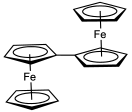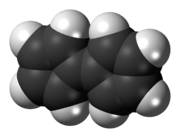Fulvalene
Fulvalene (bicyclopentadienylidene) is the member of the fulvalene family with the molecular formula C10H8. It is of theoretical interest as one of the simplest non-benzenoid conjugated hydrocarbons. Fulvalene is an unstable isomer of the more common benzenoid aromatic compounds naphthalene and azulene. Fulvalene consists of two 5-membered rings, each with two double bonds, joined by yet a fifth double bond. It has D2h symmetry.

 | |
 | |
| Names | |
|---|---|
| Other names
Bicyclopentyliden-2,4,2',4'-tetraene 1,1'-Bi[cylopentadienylidene] Pentafulvalene Bicyclopentadienylidene [5,5']Bicyclopentadienylidene | |
| Identifiers | |
3D model (JSmol) |
|
| ChEBI | |
| ChemSpider | |
PubChem CID |
|
CompTox Dashboard (EPA) |
|
| |
| |
| Properties | |
| C10H8 | |
| Molar mass | 128.174 g·mol−1 |
| Density | 1.129 g/ml |
Except where otherwise noted, data are given for materials in their standard state (at 25 °C [77 °F], 100 kPa). | |
| Infobox references | |
History
An earlier attempt at synthesis of fulvalene in 1951 by Pauson and Kealy resulted in the accidental discovery of ferrocene.[1] Its synthesis was first reported in 1958 by E. A. Matzner, working under William von Eggers Doering.[2] In this method, cyclopentadienyl anion is coupled with iodine to the dihydrofulvalene which is then doubly deprotonated with n-butyllithium to the dianion and then oxidized with oxygen. Fulvalene was spectroscopically observed at 77 K from photolysis of diazocyclopentadiene (dimerization of two cyclopentadiene carbenes) [3] with UV spectra matching those obtained by the Doering group. Final isolation of the compound came in 1986 [4] via a method similar to that of Doering. The compound was found to be nonaromatic and extremely reactive above −50 °C through Diels-Alder dimerization.
Derivatives
Perchlorofulvalene C10Cl8 is quite stable in contrast to the hydrocarbon.[5] Tetrathiafulvalene is an organic semiconductor.
References
- T. J. Kealy, P. L. Pauson (1951). "A New Type of Organo-Iron Compound". Nature. 168 (4285): 1039. doi:10.1038/1681039b0.
- Dissertation Abstracts Int'l 26-06 page 3270 6411876.
- Photochemical Experiments in Rigid Media at Low Temperatures. II. The Reactions of Methylene, Cyclopentadienylene and Diphenylmethylene William B. DeMore, H. O. Pritchard, Norman Davidson J. Am. Chem. Soc., 1959, 81 (22), pp 5874–5879 doi:10.1021/ja01531a008
- Synthese von Pentafulvalen durch oxidative Kupplung von Cyclopentadienid mittels Kupfer(II)-chlorid André Escher, Werner Rutsch, Markus Neuenschwander Helvetica Chimica Acta Volume 69 Issue 7, Pages 1644 - 1654 1986 doi:10.1002/hlca.19860690719
- Mark, V. “Perchlorofulvalene” Organic Syntheses, Collected Volume 5, p.901 (1973). http://www.orgsyn.org/orgsyn/pdfs/CV5P0901.pdf